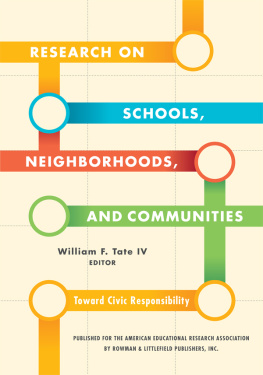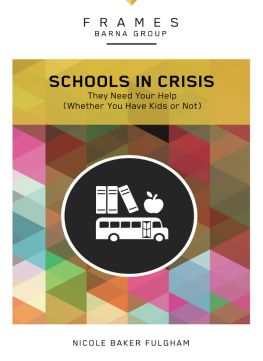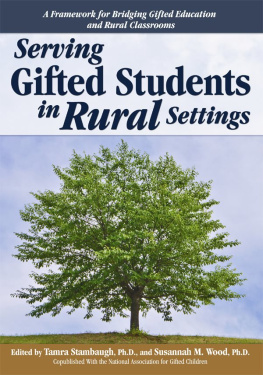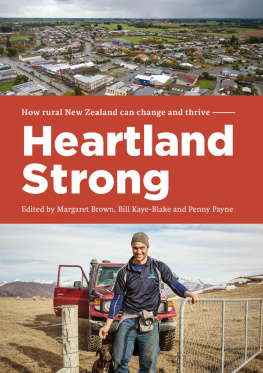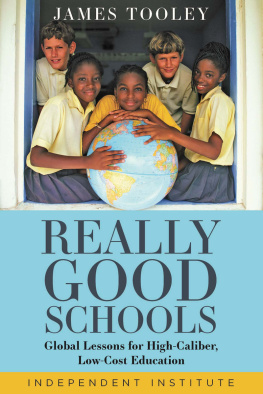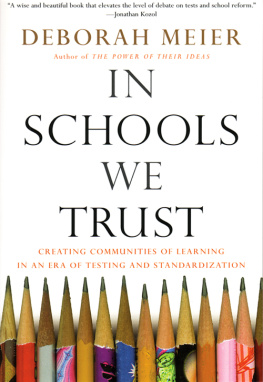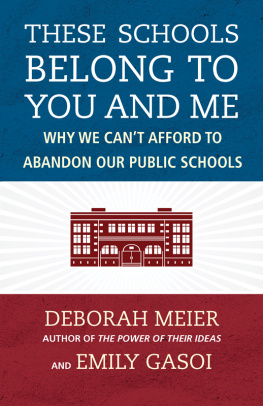Why Rural Schools Matter
This book was made possible by financial assistance from the Ruth Landes Memorial Research Fund, a program of The Reed Foundation; the Roger C. Schmutz Fund for Faculty Research via the Bates Faculty Development Fund; and the Thornton H. Brooks Fund of the University of North Carolina Press.
2014 The University of North Carolina Press
All rights reserved. Manufactured in the United States of America. Set in Miller by codeMantra.
The paper in this book meets the guidelines for permanence and durability of the Committee on Production Guidelines for Book Longevity of the Council on Library Resources.
The University of North Carolina Press has been a member of the Green Press Initiative since 2003.
Cover illustration by Sally Fry Scruggs
Library of Congress Cataloging-in-Publication Data
Tieken, Mara Casey.
Why rural schools matter / Mara Casey Tieken.
pages cm
Includes bibliographical references and index.
ISBN 978-1-4696-1848-7 (pbk : alk. paper) ISBN 978-1-4696-1849-4 (ebook)
1. Education, RuralUnited States. 2. Education, RuralUnited StatesCase studies. 3. Children with social disabilitiesEducationUnited States. 4. Children with social disabilitiesEducationUnited StatesCase studies. I. Title.
LC5146.5.T57 2014
370.91734dc23
2014020275
18 17 16 15 14 5 4 3 2 1
Contents
FOUR Where the Heart Is
School, Relationships, and the Delight Community
FIVE The Ties That Bind
Schools, Stories, and the Black Community of Earle
Acknowledgments
I am indebted to the following people for their help with this book:
My collaborators, reviewers, and editors, especially Joe Parsons, Kai Schafft, Pat Graham, Cheryl Mason Bolick, Matt Duvall, Sara Fabrizio, Chris Schiff, and Emily Kane, who were attentive, wise, and patient.
My mentors: Donna San Antonio, who reminded me to seek nuance and show care; Sara Lawrence Lightfoot, who revealed the art in science; and Mark Warren, who taught me how to be a good researcher and a good person.
My writing group: Liliana Garces, Cynthia Gordon, Ann Ishimaru, Sola Takahashi, and Amanda Taylor, who supported me, challenged me, and inspired me.
My students: my third graders in Vanleer, who moved me to start this journey, and my undergrads at Batesparticularly Mia, Teika, Asha, and Lizziewho made sure that I completed it.
My family and friends: the Brocks, who motivated me with their Viking spirit and the promise of Jack; A. J., who provided enthusiasm and a sense of humor when mine were in short supply; and Chelsea, Mom, and Dad, who had more faith in me than I ever will.
And, finally, the residents, friends, and families of Delight and Earle, who gave so generously of their time, their insights, and their couches. A special thanks to Dorothy Singleton, Cyndi Moorman, and Kathy Cole. I hope that I have done justice to your stories.
Why Rural Schools Matter
Chapter One: The Meaning of a School
The drive to school was quick, just fourteen milesU.S. Route 70 to Yellow Creek, a right onto Tennessee State Route 235, and then a left at the small red barn with the single cow at its fence. A couple of miles down on the rightafter the green road sign marking the Vanleer town line, a string of apartments patrolled by cats, and a few closed shops, furniture piled in their dusty windowswas Vanleer Elementary School, an old wooden schoolhouse surrounded by a handful of trailers and a cinderblock gym. The drive from home to school was quick in the early mornings, a drive past smoke-ringed tobacco barns and long-fallow fields, just fourteen minutes down fourteen miles of empty open road.
It was still warm when I left home to get back for the schools fund-raiser supper. The sun still glinted off steep barn roofs; the afternoon shadows still stretched across the fields; and the wide pavement still baked in the warmth of October. Quick up Yellow Creek and onto an empty Route 235, left at the lonely barn and then... standstilla long line of cars filling the road, with pickups sidling onto gravel shoulders and minivans pulling to a stop.
The schools lot was past fullpeople must have started arriving shortly after the last bell that afternoonand cars covered the playground, the field, and the schools short drive. We parkedme, the cars before and behind me, all pulling onto the grassy roadsideand joined the crowd walking toward school. I saw a few families and students that I knewa couple of children were my own third gradersbut most I didn't recognize. They knew one another, though, shouting greetings over parked cars, children running ahead and adults balancing pies and cakes in their arms. I made my way to the back doors of the cafeteria, which stood open to release the heat of food and crowds, the clatter of dishes and voices, and the sharp smell of turnip greens. Dark piles of the steaming greens, kettledrum vats of white beans, greasy wedges of cornbread, coolers of iced tea, and endless platters of desserts covered the serving line. The supply of food was immense, enough to feed armies.
The food didn't surprise me; I'd come to expect these quantities at suppers in Tennessee. It was the crowd that astonished meall the cars that lined the darkening road and the people that now filled the cafeteria. Adults were squeezed in at tables made for children, babies were perched on laps and shoulders, Styrofoam trays were laid end to end, and a long line of hungry people was circling the tables and snaking toward the back. Even with the preparations all weekthe farmer volunteering his acres of turnips, the teachers picking their leafy tops, the washed greens lying on towels throughout the kitchen, the beans simmering on the stoves, the pile of cookies growing in the back roomI still hadn't expected this crowd. This sleepy, no-stop-light, more-closed-than-open town and its surrounding, equally sleepy hollows had suddenly yielded an entire community of people, a community of students and parents and grandparents and alumni and cousins and friends stretching back generations, an entire community hungry for beans and greens, for food and fellowship. That night, this community turned out for its school. And it would again and againfor auctions and Christmas concerts and firehouse fund-raisers, to raise property taxes and christen a new school building, to fight off consolidation one more time.
It was here, over three years of beans and greens suppers, the ground-level skirmishes and compromises of education politics, and the quiet rhythms of ordinary school days, that Ia young teacher, new to Vanleer, new to life in a rural townbegan to learn just what a school means to a community. The school, it became clear, was important socially; it sustained relationships between students and teachers, sustained ties among alumni and across generations, sustained me and my quickly growing roots in this place. And it mattered economically, too, bringing business to the few gas stations, the little meat-and-three, and the small bank right down the road.
But these more obvious lessons of fellowship and finance gave way to complexities. I would soon notice other patternscafeteria benches lined with singularly white families, classroom desks filled with nearly all white children, crowds less striking for whom they included than for whom they didn't. I would notice the silence about race and the quiet assumption that race simply didn't matter to a rural, almost entirely white school like Vanleer. And, eventually, I would hear rumors of a lynching tree, an old tree with smooth, wide limbs standing just outside town. I would wonder about the knotty racial histories hidden below this tranquil surface and wonder how the school was tangled in these histories and patterns, too.
And I would learn more about the tensions buzzing through the hallways and classrooms, tensions fueled by the growing power of the state and federal governments, tensions that led to a constant anxiety about the future. I would learn to prominently display my blue book of Tennessee state standards on my desk, and, for a few days every spring, I would send my students home with messages about the value of a good breakfast, arrange their desks at odd angles throughout the room, refuse to answer panicked requests for assistance, and pass out the state test bookletsand I would wonder about all of the things that now weren't getting taught. I would hear the threats of consolidation, whispered fears that would ripple through the staff, fears that the districts smallest, most rural school would finally be deemed just too small and too rural to remain open and the children would be bused to other, larger facilities.
Next page

